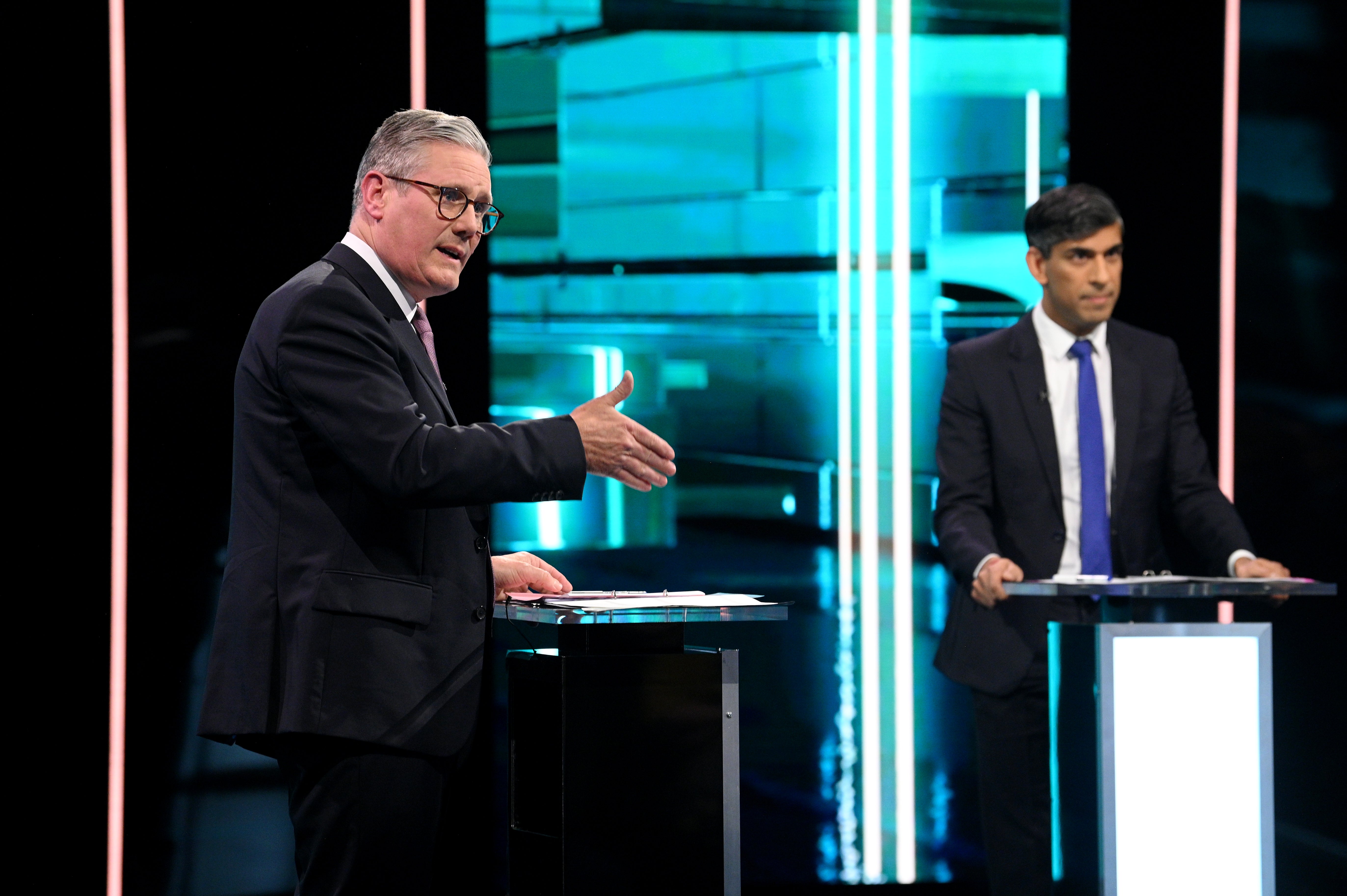Sunak or Starmer: who won the first general election TV debate?
To win, the Labour leader simply had to hold the prime minister to a draw, writes John Rentoul


Your support helps us to tell the story
From reproductive rights to climate change to Big Tech, The Independent is on the ground when the story is developing. Whether it's investigating the financials of Elon Musk's pro-Trump PAC or producing our latest documentary, 'The A Word', which shines a light on the American women fighting for reproductive rights, we know how important it is to parse out the facts from the messaging.
At such a critical moment in US history, we need reporters on the ground. Your donation allows us to keep sending journalists to speak to both sides of the story.
The Independent is trusted by Americans across the entire political spectrum. And unlike many other quality news outlets, we choose not to lock Americans out of our reporting and analysis with paywalls. We believe quality journalism should be available to everyone, paid for by those who can afford it.
Your support makes all the difference.Keir Starmer knew that all he had to do was to get through the debate without making a horrible mistake. No wonder he was nervous, unsure whether to address the audience, his opponent, or presenter Julie Etchingham.
He had a good start, sounding more sympathetic to Paula from Huddersfield, who has to cook in batches to save electricity – although it took him some time to get round to “my dad was a toolmaker; my mother was a nurse; our phone was cut off”.
Sunak knew that he had to disrupt his opponent and unsettle people about the prospect of a Labour government. He seemed relaxed but combative, interrupting Starmer repeatedly and demanding to know why he wanted to make life more difficult for people by putting up their taxes.
The Labour leader was slow, again, to respond, eventually calling the figure of £2,000 in extra taxes that the prime minister used “garbage”. It was, he pointed out, arrived at by feeding assumptions into the Treasury – assumptions that included Tory policies by mistake.
Sunak scored the first win of the debate on the unexpected subject of NHS strikes, drawing applause from the studio audience, saying the junior doctors want “a 35 per cent pay rise and I don’t want to raise your taxes to pay for that”.
Starmer looked genuinely frustrated when Sunak challenged him on how he would resolve the dispute, and was reduced to a sulky “when I can get a word in edgeways”, which he repeated later. But the prime minister had made his point – that Starmer’s airy promise to “get people in a room together” was a bit rubbish.
After that, though, Starmer turned the tide, mentioning Liz Truss as often as he could and having the better applause lines. He was clapped for saying that VAT on school fees was “a tough choice, I do understand that”. He was clapped for promising to “end non-dom status completely” – even though, as Sunak pointed out, the Conservative government has already done it – and to make “oil and gas companies pay their fair share”. And he was clapped for promising to “smash the gangs” to stop the boats.
Sunak, on the other hand, attracted mocking laughter when Starmer challenged him on his claim that NHS waiting lists were “coming down”. Starmer pointed out that they had gone up since Sunak had promised to get them down; Sunak countered: “They are coming down from when they were higher.”
He was also laughed at when he tried to defend national service as an “opportunity” for young people. But he did win the last round of applause for a line that the Tories have used before and that I thought was too defensive: “If you think Labour are going to win, start saving.”
By then, Starmer had got over his early nerves and appeared to realise that he was playing politics on easy mode. He kept pointing out that the Tories had been in power for 14 years, and that Sunak didn’t seem keen to defend the record. Sunak kept saying that the election was about the future.
Sunak finally had a strong message for his closing statement: “In uncertain times we simply cannot afford an uncertain prime minister. If you don’t know what you’re going to get from Labour don’t vote for it.” But before he got to it, he had to pause to take a sideswipe at the ghost at the feast: Nigel Farage. The election was a choice between him and Starmer as prime minister, said Sunak: “A vote for anyone else makes it more likely that it will be him.”
The debate confirmed that Sunak was quicker and sharper, and that Labour’s policies are only barely battle-ready. But it also confirmed that Sunak has been fighting a hopeless battle from the start, and that the words “Liz Truss” are enough to bring most political arguments to an end.
YouGov’s snap poll showed nearly a dead heat, with 51 per cent saying Sunak “won”, and 49 per cent Starmer.
That was all that Starmer needed to do to clear the most important of the foreseeable hurdles in this election campaign. It was striking that his irritability was more in evidence than Sunak’s past tetchiness, which had been suppressed completely.
We had better get used to Starmer’s weary and humourless dismissiveness, because we will see a lot more of it when he becomes prime minister.
Join our commenting forum
Join thought-provoking conversations, follow other Independent readers and see their replies
Comments